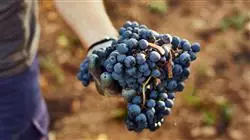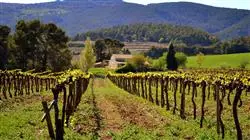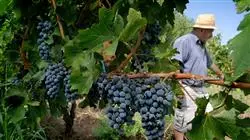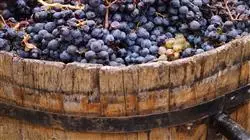University certificate
The world's largest faculty of engineering”
Why study at TECH?
With this Postgraduate diploma you will master the compounds of grapes and wine so that you can identify failures in the winemaking process and propose new sustainable options in your own company"

Wine is a product that is a worldwide passion. However, its slow production and the scarcity of natural resources is shaking the foundations of this sector. It is a very powerful industry economically, so organizations are already looking for alternatives to traditional plantations to maximize profits with less impact on the environment. Mastering winemaking processes and the new technologies that will accompany production in future years are some of the skills to be acquired by wine professionals.
The adaptation of grapes to drier environments can occur naturally. However, there are technological tools that have already proven to be key in this regard. One of them is AgroMapping, this technology is already being applied by many companies and allows them to interpret, through drones, the crop maps and detect, in turn, needs in fertilizer, pruning or irrigation. In addition, AI is fundamental in this scientific revolution, because thanks to it, research has been obtained, such as the collaboration project between the ERDF and the CDTI. A study that demonstrated the combination of data with cadastral and climatological information for real-time crop monitoring on farms.
These are just a few of the advances that agricultural engineers must be up to date with in order to be part of the vanguard in this sector. For this reason, TECH has developed a comprehensive 6-month program, which delves into the state of the world's wine regions; the winemaking processes, its components from the agricultural phase, as well as the varieties in the product itself, white, rosé and red wines. All this, through a 100% online mode that provides ease and flexibility for students to study from anywhere and at any time, having only an electronic device and Internet connection.
Enroll now in a program that will not only teach you to understand grape varieties and wine styles, but will turn you into a multidisciplinary professional capable of providing agricultural solutions"
This Postgraduate diploma in Viticulture contains the most complete and up-to-date program on the market. The most important features include:
- Case studies presented by experts in Enological Engineering and Viticulture.
- The graphic, schematic, and practical contents with which they are created, provide practical information on the disciplines that are essential for professional practice
- Practical exercises where the self-assessment process can be carried out to improve learning
- Its special emphasis on innovative methodologies
- Theoretical lessons, questions to the expert, debate forums on controversial topics, and individual reflection assignments
- Content that is accessible from any fixed or portable device with an Internet connection
Thanks to the knowledge that TECH will offer you, you will learn about the environmental status of wine-growing territories worldwide and you will deal with comparative information"
The program’s teaching staff includes professionals from the sector who contribute their work experience to this educational program, as well as renowned specialists from leading societies and prestigious universities.
Its multimedia content, developed with the latest educational technology, will provide the professionals with situated and contextual learning, i.e., a simulated environment that will provide an immersive education programmed to learn in real situations.
The design of this program focuses on Problem-Based Learning, by means of which the professionals must try to solve the different professional practice situations that are presented throughout the academic course. For this purpose, the students will be assisted by an innovative interactive video system created by renowned experts.
Farm monitoring is already a reality, do you want to join the technological change? Get it with TECH"

Still don't know the keys to fermentation technology? Join this Postgraduate diploma to foresee the possible risk factors of wine"
Syllabus
The syllabus of this Postgraduate diploma in Viticulture has been designed by experts in the area who will transmit their knowledge through audiovisual content that is easy to assimilate and that will prepare them for real performance in the work environment through the simulation of cases. In addition, TECH applies the innovative Relearningmethodology, which exempts students from cumbersome hours of study, so that they become experts in a simple and gradual way. In this way, the 100% online study is adapted to the work and personal needs of the specialists.

Delve into the correct management of oenological products and propose new alternatives to soil exploitation to mitigate the effect of drought on your own production"
Module 1. Viticulture
1.1. Preparation of the Plantation
1.1.1. Viticultural Soil Science
1.1.2. Interpretation of Soil Analyses
1.1.3. Correct Preparation of the Planting Bed
1.1.3.1. Types of Implements and Work Performed
1.1.4. Analysis of the Different Planting Systems
1.2. Correct Choice of Vine Rootstocks
1.2.1. Types of Vine Rootstocks
1.2.2. Characteristics and Functions of Vine Rootstocks
1.2.3. Vine Nurseries
1.3. Pruning
1.3.1. Pruning Seasons
1.3.2. Execution of Cuts
1.3.3. Control and Disinfection of Wounds
1.4. Soil Maintenance
1.4.1. Plowing
1.4.1.1. Advantages and Disadvantages. 1.4.1.2. Types of Tools
1.4.1.2.1. Cultivator
1.4.1.2.2. Inter-Vine Cultivator
1.4.1.2.3. Subsoiler
1.4.1.2.4. Chisel
1.4.1.3. Plowing Seasons
1.4.2. Plant Covers
1.4.2.1. Recommended Species for Cover Crops
1.4.2.2. Planting Systems
1.4.2.3. Maintenance of Green Covers
1.4.3. Inconveniences of Invasive Flora
1.4.4. Control of Invasive Flora
1.5. Rational Control of Pests and Diseases
1.5.1. Main Pests and Diseases of Grapevine
1.5.2. Phytosanitary
1.5.2.1. Contact
1.5.2.2. Penetrants
1.5.2.3. Systemic
1.5.3. Forms of Action of Phytosanitary Products
1.5.4. Ecological Preparations
1.5.5. Biological Control
1.5.6. Correct Application of Phytosanitary Products
1.6. Risk Management
1.6.1. Advantages and Disadvantages of the Different Irrigation Systems
1.6.1.1. Sprinkling
1.6.1.2. Drip
1.6.1.3. Exudation Bands
1.6.2. Water Requirements of Grapevines
1.6.2.1. Irrigation Periods
1.6.2.2. Calculation of Irrigation Requirements
1.6.3. Water Stress
1.7. Green Operation
1.7.1. The Importance of Green Pruning
1.7.1.1. Green Pruning Seasons
1.7.2. Green Pruning
1.7.3. Thinning
1.7.4. Cluster Thinning
1.8. Ripening and Harvesting
1.8.1. Grape Ripening
1.8.2. Advantages and Disadvantages of Grape Harvesting Systems
1.8.3. Harvesting Costs
1.9. Wine Regions of the World
1.9.1. France
1.9.2. Italy
1.9.3. Greece:
1.9.4. Australia and New Zealand
1.9.5. South Africa
1.9.6. USA
1.9.7. South America
Module 2. Grape and Wine Compounds. Analytical Techniques
2.1. Components of the Grape and their Distribution in the Grape Bunch
2.1.1. Vegetative and Reproductive Cycle of the Grapevine
2.1.2. Morphological Description and Composition of the Bunch
2.1.3. Chemical Composition of the Fruit
2.2. Chemical Composition of Must and Wine
2.2.1. Sugars
2.2.2. Organic acids
2.2.3. Nitrogen Compounds
2.2.4. Minerals
2.2.5. Polyphenols
2.2.6. Vitamins
2.2.7. Volatile Compounds
2.3. Organic Acids
2.3.1. Organic Acids
2.3.2. Main Acids in Grapes
2.3.3. Main Acids in Fermentation
2.4. Polyphenols
2.4.1. Non-Flavonoid Compounds
2.4.2. Flavonoids
2.4.3. Modifications of Phenolic Compounds During Ripening
2.5. Sugars
2.5.1. Structure and Classification
2.5.2. Glucose and Fructose
2.5.3. Other Sugars
2.5.4. Chemical Properties
2.5.5. Pectins
2.6. Nitrogen Compounds
2.6.1. Total Nitrogen and Assimilable Nitrogen
2.6.2. Amino Acids
2.6.3. Proteins
2.6.4. Other Forms of Nitrogen
2.7. Aromas and Other Volatile Compounds
2.7.1. Varietal Aroma
2.7.2. Volatile Components of the Pre-Fermentative Stage
2.7.3. Volatile Components of the Fermentative Stage
2.7.4. Volatile Constituents of Wine During Storage
2.8. Enzymes
2.8.1. Polyphenoloxidases
2.8.2. Aldehyde and C6 Alcohol Forming Enzymes
2.8.3. Glycohydrolase Enzymes
2.8.4. Proteolytic Enzymes
2.9. Classical Enological Analysis
2.9.1. Acid Analysis Methods
2.9.2. Sugar Analysis Methods
2.9.3. Methods of Alcohol Analysis
2.9.4. Methods of Polyphenol Analysis
2.9.5. Methods of Wine Additive Analysis
2.10. Advanced Enological Analysis
2.10.1. Liquid Chromatography: Enological Applications
2.10.2. Gas Chromatography: Enological Applications
2.10.3. Electronic Organoleptic Analysis
Module 3. Vinification of White and Rosé Wines
3.1. White Grape Varieties and Wine Styles
3.1.1. Main Varieties in the Iberian Peninsula
3.1.2. Main Varieties in France
3.1.3. Main Varieties in Italy
3.1.4. Main Varieties in South America
3.1.5. Main Varieties in North America
3.1.6. Main Varieties in South Africa
3.1.7. Main Varieties in Australia and New Zealand
3.1.8. Introduction to the Main Processing Styles
3.2. White Grape Ripening Parameters
3.2.1. Ripeness Indexes
3.2.2. Ripeness and Ideal Time of Harvest
3.2.3. Quality Criteria for Reception of White Grapes
3.3. Reception of White Grapes
3.3.1. Harvest and Reception in the Winery
3.3.2. Destemming and Crushing
3.3.3. Maceration and Pressing
3.4. Pre-Fermentation Actions
3.4.1. Protection of Must Against Oxidation
3.4.2. Must Racking and Clarification
3.4.3. Must Corrections
3.5. Alcoholic Fermentation of White Wines
3.5.1. Vatting and Types of Tanks and Vessels for Fermentation
3.5.2. Inoculation of Wine Yeasts, Vat Feet and Spontaneous Fermentations
3.5.3. Nitrogen Feeding and Must Aeration
3.6. Temperature Control
3.6.1. Control of Fermentation Temperature
3.6.2. Control and Analytical Monitoring of Alcoholic Fermentation
3.6.3. Control and Monitoring of the End of Alcoholic Fermentation
3.7. Other Fermentations and Aging of White Wines
3.7.1. Malolactic Fermentation
3.7.2. Aging on Lees
3.7.3. Fermentation and/or Barrel Aging
3.8. Processes of Clarification, Stabilization and Filtration of White Wines
3.8.1. Clarification Processes
3.8.2. Stabilization Processes
3.8.3. Filtration Processes
3.9. Bottling
3.9.1. Control of Pre-Bottling Analytical Parameters
3.9.2. Control of Parameters During Bottling of White Wine
3.9.3. Cork Stoppers and Alternative Closures for White Wine
3.10. Special Fermentations
3.10.1. Ice Wines
3.10.2. Fermentation with Skins
3.10.3. Orange Wines
Module 4. Vinification of Red Wines
4.1. Red Grape Varieties
4.1.1. Main Varieties in the Iberian Peninsula
4.1.2. Main Varieties in France
4.1.3. Main Varieties in Italy
4.1.4. Main Varieties in South America
4.1.5. Main Varieties in North America
4.1.6. Main Varieties in South Africa
4.1.7. Main Varieties in Australia and New Zealand
4.2. Red Grape Ripening Parameters
4.2.1. Ripeness Indexes
4.2.2. The Time of Harvest
4.2.3. Controls on Entry into the Winery
4.3. Reception of Red Grapes
4.3.1. Reception at the Winery
4.3.2. Destemming and Crushing
4.3.3. The Casing Processes
4.3.4. Types of Tanks for the Fermentation of Red Wines
4.4. Alcoholic Fermentation of Red Wines
4.4.1. Pumping-Over and Maceration Processes
4.4.2. Analytical Controls During Alcoholic Fermentation
4.4.3. Fermentative Thermodynamic Controls
4.4.4. Inoculation of Wine Yeasts
4.4.5. Fermentation Kinetics
4.5. End of Alcoholic Fermentation
4.5.1. The Discovery Processes
4.5.2. The Pressing Process
4.5.3. Treatment of Red Wines after Alcoholic Fermentation
4.6. Malolactic Fermentation
4.6.1. Chemical Transformations of Wine
4.6.2. Thermodynamic Processes of MLF
4.6.3. Lactic Bacteria and Inoculation
4.6.4. Co-Inoculation of Bacteria Prior to Alcoholic Fermentation
4.6.5. Analytical Controls during MLF
4.7. The Aging of Red Wines
4.7.1. Preparation before Barrel Aging
4.7.2. Legal Aspects of Red Wine Aging
4.7.3. Analytical Controls During Aging
4.7.4. Analytical Controls During Aging
4.8. Bottling of Red Wines
4.8.1. Clarification Processes
4.8.2. Filtration Processes
4.8.3. Filtering Processes
4.8.4. Control of Pre-Bottling Analytical Parameters
4.9. Bottle Aging Processes
4.9.1. The Importance of the Cork Stopper
4.9.2. Analytical Controls During Bottle Aging
4.9.3. Legal Aspects of Bottle Aging
4.9.4. Other Types of Bottle Sealing for Aging of Red Wines
4.10. Special Fermentations
4.10.1. Carbonic Maceration
4.10.2. Elaborations with Stalks
4.10.3. Sulfite-Free Processes
4.10.4. Special Packaging
4.10.5. Earthenware Jars
4.10.6. Wooden Tanks
4.10.7. Granite Deposits
4.10.8. Technical Concrete Tanks

A program designed for professionals like you, who wish to intensively investigate the wine process, from its initial phase to its bottling"
Postgraduate Diploma in Viticulture
Are you passionate about the world of viticulture and dream of becoming an expert in this fascinating field? TECH Global University has the perfect solution for you. Our Postgraduate Diploma in Viticulture program will provide you with the knowledge and skills you need to excel in this exciting industry. We are committed to providing you with a quality education tailored to your needs. That's why our program offers online classes, allowing you to learn in a flexible and enriching way from anywhere. During the 6 months, you will have the opportunity to work with viticulture experts who will share with you their experience and knowledge in grape growing, vineyard management and quality wine production. Through interactive online classes, you will be able to explore the most advanced techniques and best practices to obtain high quality grapes and make exceptional wines.
Learn how to grow grapes and make exceptional wines.
Learn in a flexible and enriching way in online classes.
At TECH, we have an online learning platform designed to provide you with an effective and enriching educational experience. You will be able to access up-to-date study materials, participate in real-time discussions with professors and classmates, and perform hands-on activities that will allow you to apply what you have learned. Upon completion of this program, you will be prepared to face the challenges of the world of viticulture and will have the skills necessary to work in wineries, vineyards or wine-related enterprises. Our graduates have excelled in the industry and have contributed to the growth and development of the wine sector. Don't miss this unique opportunity to develop your expertise in viticulture. Enroll now and get on the path to a successful career in the world of wine - we are waiting for you with open arms!







